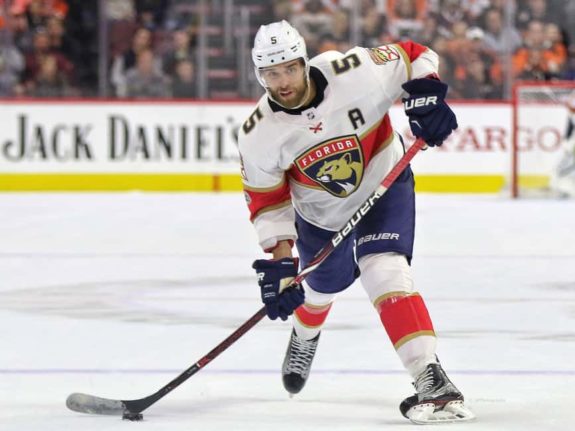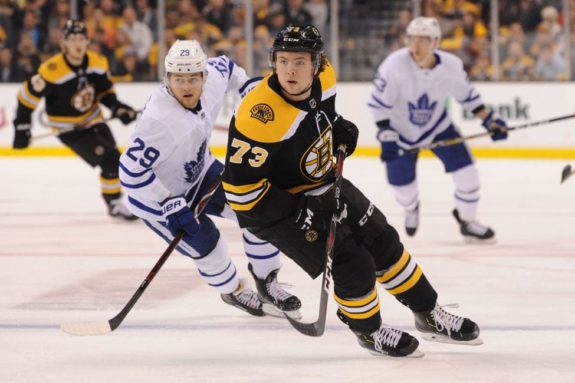![]()
Earlier this month, The Athletic’s Fluto Shinzawa reported that Boston Bruins defenseman Charlie McAvoy had turned down a long-term offer to extend his career in Boston (from “‘A tough deal to do:’ Charlie McAvoy’s next contract could be for big money” – The Athletic – 2/19/19).
His decision to decline the offer, Shinzawa says, was related to the eight-year, $7.5 million AAV contract that Florida Panthers defenseman Aaron Ekblad signed in the summer of 2016. More than two years after signing that deal, Ekblad remains the 10th-highest paid defenseman in the NHL.
With McAvoy set to become a restricted free agent this summer, the Boston brass will be focused on locking down their apparent d-man of the future but, should the decision to reject the recent offer be cause for concern?
Comparing McAvoy and Ekblad
The first step is to determine how much McAvoy is worth. If the 21-year-old is reportedly looking for a contract similar to Ekblad’s, it makes sense to compare the two players. In 2017-18, McAvoy’s age-20 rookie season, he netted seven goals and 32 points in 63 games. In Ekblad’s age-20 season, he finished with 21 points in 68 games, meaning McAvoy outpaced Ekblad offensively.
All the while, McAvoy has been Boston’s number-two defenseman, posted regularly alongside veteran big-man Zdeno Chara. On the top pairing, McAvoy has drawn some difficult defensive assignments and has been pretty effective.

McAvoy’s Corsi for percentage at even strength (54.8 percent at age 20, 51.3 percent at age 21) is a tick above where Ekblad’s was at the same age (52.1 percent at age 20, 49.0 percent at age 21), signaling slightly better possession for McAvoy.
That being said, Ekblad’s workload at McAvoy’s age was heavier (which is saying something, as McAvoy leads Bruins skaters in average ice time per game). McAvoy averaged 22:09 of ice time last season and 21:49 this season, whereas Ekblad averaged 21:28 and 23:23 of ice time in his age-20 and 21 seasons, respectively.
Additionally, McAvoy’s ice time has been limited because of injuries. Ekblad appeared in 150 games in his age-20 and 21 seasons. The maximum that McAvoy could appear in over that span (assuming he remains healthy through the rest of the season) is 118 games. The Bruins will likely point toward McAvoy’s injury problems (and the time he’s missed) as negotiations continue.
Negotiation for Now vs. Future
Negotiating contracts for young players is always a balancing act, especially when it comes to long-term deals. For a 21-year-old that an organization wants to lock down, they’re paying for what that player is worth now and in the future.
As things stand, McAvoy is the centerpiece of Boston’s future defense. Although he’s in the early stages of his career, he’s the type of player you can build a franchise around. As such, it makes sense that he wants to get paid like a franchise player, especially if he’s negotiating for future seasons when he’s expected to perform at an elite level.
The question is, how much can the Bruins afford to pay McAvoy, and does their price range allow for a long-term deal given what McAvoy’s camp is looking for? If the Bruins were to hand McAvoy $7.5 million per year, he’d become Boston’s highest-paid player. For reference, All-Star winger David Pastrnak, who signed a deal with the Bruins before his age-21 season, is earning an average of $6.66 million annually. Such a deal would also put McAvoy a quarter-million above David Krejci, who is the team’s highest-paid player at $7.25 million AAV.

So, where’s the middle ground? The Bruins would ideally ink a long-term deal with McAvoy in order to secure the keystone of their future defense corps. McAvoy’s camp, however, is going to want a larger sum for a long-term deal, as such a deal would take future negotiations (and the opportunity to grab an unrestricted free agent pay-bump) off the table for quite a while. Whether or not the two sides can come to an agreement remains to be seen.
Of course, the Bruins may be forced to settle for a short-term deal and will do their best to stay away from a very short-term deal, which would give McAvoy heavy negotiating power with other teams if he has a breakout season. A mid-range deal would be a compromise.
My colleague Brandon Share-Cohen suggested the possibility of a five-year, $6.5 million deal. Something along those lines would make sense as it would give McAvoy some coin without locking him up past the age of 26. Boston would obviously like a longer deal, but something in the four to five-year range might be a necessary compromise.
Cause for Concern?
Should the Bruins be concerned about McAvoy declining their offer? At this point, no. The negotiating process for players like McAvoy is difficult, and bumps in the road are inevitable and this in no way means he’s unhappy in Boston. It’s a matter of business. At its most simple form, it’s an employee trying to get the most it can out of an employer. Who wouldn’t?
If the summer rolls around and no progress is made, then we can re-visit whether or not it’s concerning, but at this point it’s not much of a worry.

At the end of the day, the Bruins recognize McAvoy’s position and importance to their organization. They’ll find a way to negotiate a deal that’s acceptable for McAvoy’s camp, even if it doesn’t come with the term that Boston is hoping for.